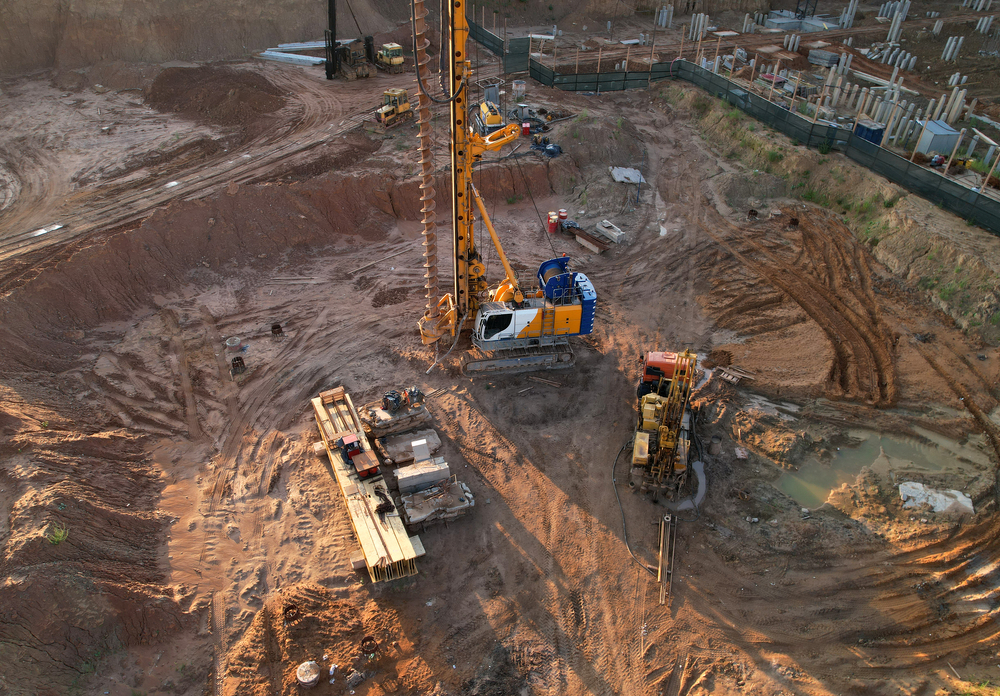The Ultimate Guide To Geotheta
The Ultimate Guide To Geotheta
Blog Article
The Buzz on Geotheta
Table of ContentsGeotheta Things To Know Before You BuyOur Geotheta StatementsExcitement About GeothetaGeotheta Can Be Fun For EveryoneThe smart Trick of Geotheta That Nobody is Talking About

They conduct site investigations, gather examples, execute laboratory tests, and examine data to assess the suitability of the ground for building jobs - Consulting Engineer. Based upon their searchings for, geotechnical designers give referrals for structure layout, incline security, retaining structures, and mitigation of geotechnical hazards. They team up with various other experts, such as engineers, structural engineers, and building and construction teams, to guarantee that geotechnical considerations are integrated into the general job style and execution
By assessing the behavior and residential properties of soil and rock, they can determine prospective geotechnical risks such as landslides, soil settlement, or incline instability. Their experience aids stop failures or accidents that can jeopardize lives and home. Here are some detailed duties and responsibilities of a geotechnical designer: Website Examination: Geotechnical designers conduct site examinations to gather data on subsurface conditions.
They analyze the data to understand the residential or commercial properties and behavior of the dirt and rock, including their stamina, permeability, compaction characteristics, and groundwater conditions. Geotechnical Evaluation and Style: Geotechnical engineers evaluate the data collected throughout site investigations to evaluate the stability and suitability of the site for building jobs. They perform geotechnical estimations and modeling to review elements such as bearing capacity, negotiation, incline stability, side planet pressures, and groundwater flow.
Geotheta Can Be Fun For Everyone
Foundation Style: Geotechnical designers play an important duty in designing structures that can safely sustain the intended framework. They assess the dirt conditions and tons requirements to establish the proper foundation kind, such as shallow structures (e.g., grounds), deep structures (e.g (https://www.awwwards.com/geotheta/)., piles), or specialized methods like soil improvement. They consider variables such as negotiation limits, bearing capacity, and soil-structure communication to establish optimum structure styles
They evaluate construction strategies, monitor website activities, and perform field evaluations to verify that the layout recommendations are followed. If unexpected geotechnical problems emerge, they assess the situation and provide recommendations for remediation or modifications to the design. Threat Evaluation and Mitigation: Geotechnical designers examine geotechnical risks and risks associated with the task website, such as landslides, liquefaction, or dirt erosion.

Collaboration and Communication: Geotechnical engineers work very closely with other specialists entailed in a project, such as engineers, architectural engineers, and building and construction groups. Efficient interaction and cooperation are necessary to incorporate geotechnical factors to consider into the general job style and building and construction process. Geotechnical designers provide technological proficiency, answer inquiries, and ensure that geotechnical needs are fulfilled.
What Does Geotheta Do?
Right here are some sorts of geotechnical designers: Foundation Engineer: Foundation designers focus on developing and evaluating structures for structures. They analyze the soil conditions, tons requirements, and website features to figure out the most suitable foundation kind and style, such as shallow foundations, deep structures, or specialized techniques like stack foundations.
They examine the elements influencing slope security, such as soil buildings, groundwater problems, and incline geometry, and create methods to avoid incline failings and minimize risks. Earthquake Engineer: Earthquake designers focus on evaluating and creating structures to hold up against seismic pressures. They analyze the seismic threat of a website, assess dirt liquefaction capacity, and create seismic style standards to ensure the safety and resilience of structures during quakes.
They perform field testing, collect samples, and evaluate the accumulated data to characterize the dirt properties, geologic developments, and groundwater conditions at a site. Geotechnical Instrumentation Designer: Geotechnical instrumentation designers concentrate on monitoring and gauging the behavior of soil, rock, and structures. They set up and maintain instrumentation systems that check aspects such as soil settlement, groundwater degrees, slope activities, and structural variations to examine efficiency and offer very early warnings of prospective concerns.
The Buzz on Geotheta
They conduct examinations such as triaxial examinations, loan consolidation tests, direct shear tests, and leaks in the structure examinations to collect information for geotechnical go to website evaluation and design. Geosynthetics Engineer: Geosynthetics engineers specialize in the layout and application of geosynthetic products, such as geotextiles, geogrids, and geomembranes. They use these materials to enhance dirt security, reinforce slopes, offer drain services, and control disintegration.
They have a tendency to be investigatory people, which means they're intellectual, introspective, and analytical. They are interested, methodical, reasonable, analytical, and logical. Some of them are additionally social, indicating they're kind, charitable, participating, patient, caring, handy, compassionate, skillful, and friendly. Does this seem like you? Take our totally free career examination to figure out if geotechnical designer is one of your leading career matches.
In the workplace setting, geotechnical engineers make use of specialized software program tools to carry out calculations, produce layouts, and examine data. They prepare reports, evaluation task specifications, interact with clients and team participants, and coordinate task activities. The office setup gives a helpful environment for study, analysis, and collaboration with various other specialists included in the task.
Geotheta Fundamentals Explained
They often visit task websites to carry out website examinations, examine geotechnical problems, and collect data for evaluation. These visits include traveling to different locations, occasionally in remote or tough terrains. Geotechnical engineers may perform soil tasting, conduct examinations, and monitor building tasks to guarantee that the geotechnical elements of the task are being executed appropriately.
Geotechnical engineers likewise work in specialized geotechnical laboratories. Geotechnical lab engineers work thoroughly in these atmospheres, managing screening tools, running tools, and recording data.
Report this page